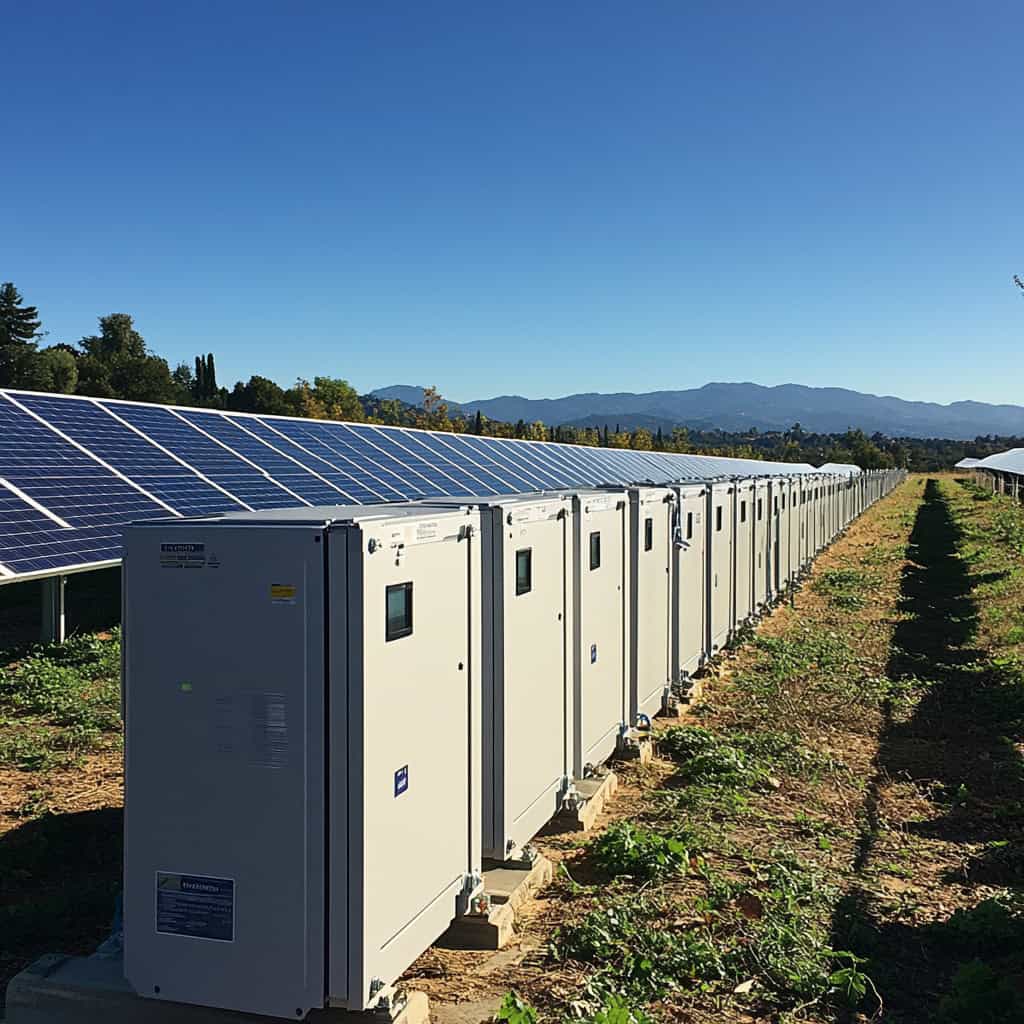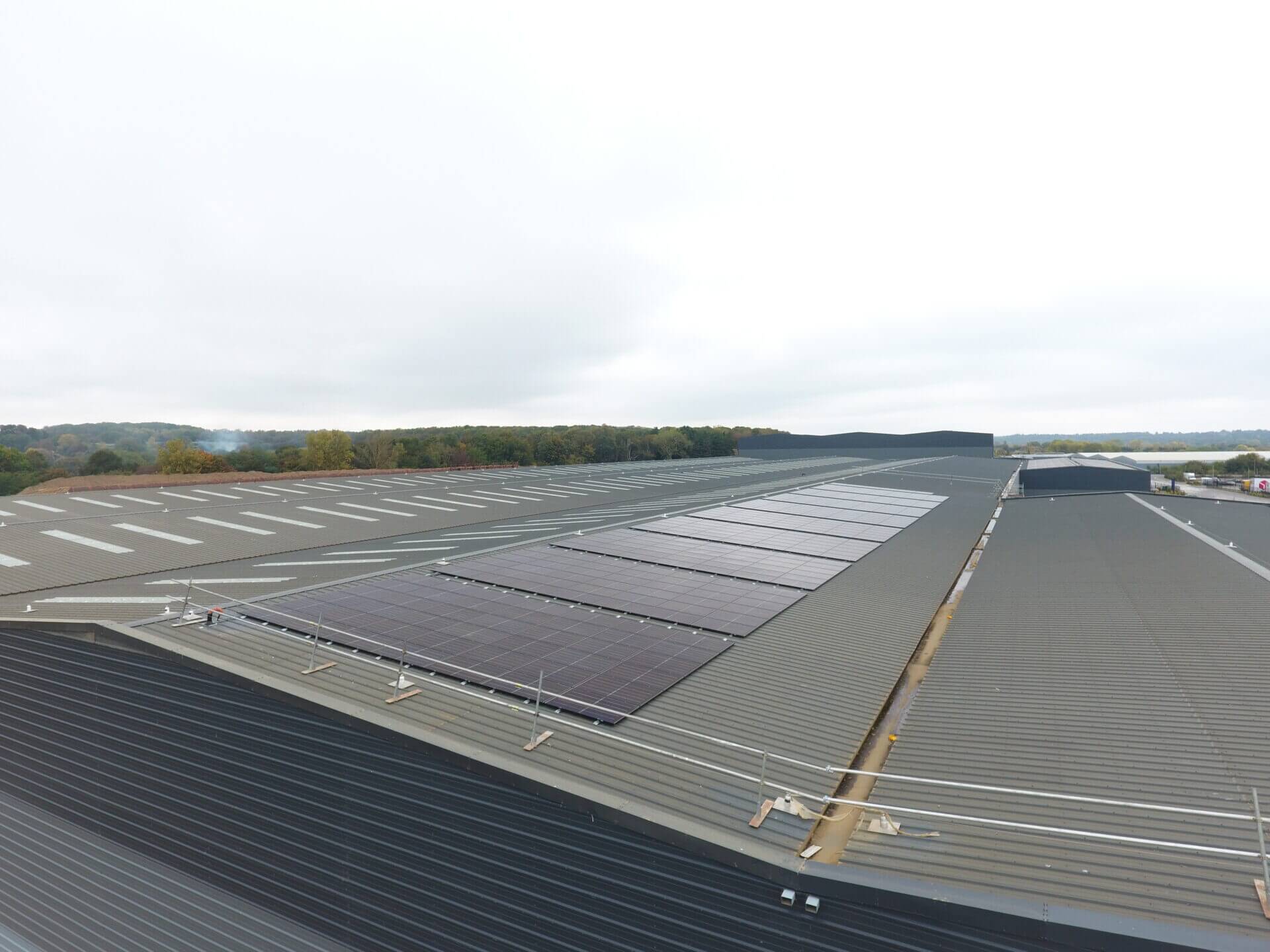In today’s fast-changing energy scene, solar batteries are becoming key players in the push for sustainable power solutions. These powerhouses aren’t just parts of an off-grid system; they’re crucial for achieving energy independence and getting the most out of your solar investments.
Whether you’re a business looking to go fully autonomous or just trying to cut down on grid reliance, getting a handle on solar batteries is a must.
In this article, we’ll go into the diverse world of solar batteries, explore their types, and show how they can be seamlessly integrated into your energy systems.
Introduction to Solar Batteries
Solar batteries are the backbone of any off-grid or hybrid solar power system. They store the excess electricity generated by your solar panels during the day for use later, enabling energy independence and continuous power.
Whether you’re aiming for full self-sufficiency or just want to lower your reliance on the grid, a solar battery is key to making the most of your renewable energy investment.
For businesses, especially those with unpredictable energy demands, solar batteries offer not just a backup solution but a strategic advantage.
They ensure that operations continue smoothly without interruption, irrespective of external power outages or grid failures.

Types of Solar Batteries
Lead-Acid Batteries: A cost-effective option, typically used in off-grid systems. These batteries are reliable but have a shorter lifespan and require regular maintenance.
Lithium-Ion Batteries: The most popular choice for residential and commercial solar systems today. They offer a longer lifespan, higher efficiency, and are relatively maintenance-free compared to lead-acid batteries.
Flow Batteries: Emerging as an innovative solution for long-duration energy storage, flow batteries have a unique chemistry that allows for more cycles and better durability, although they are still more expensive.
Nickel-Based Batteries: Known for their robustness and ability to operate in extreme temperatures, though they are less common due to higher costs and environmental concerns.

Key Considerations When Choosing a Solar Battery
Capacity
Understanding capacity is the first step in selecting the right solar battery for your needs. Measured in kilowatt-hours (kWh), this metric dictates the total amount of energy the battery can store.
Businesses must align their battery choice with their energy consumption patterns to maximise efficiency.
Choosing a battery with sufficient capacity ensures that you have enough stored energy for peak demand periods, avoiding unnecessary reliance on the grid.
This consideration is crucial for maintaining operational continuity and achieving energy independence.
Power Output
Power output determines how much energy your battery can deliver at any given time. A battery with higher output capabilities can simultaneously power more devices, making it ideal for business environments with multiple energy demands.
Balancing capacity with power output is vital. While a battery might store ample energy, if it can’t deliver it quickly enough, it won’t be effective for real-time operations. Evaluate your business’s energy needs carefully to ensure seamless integration.
Cycle Life
Cycle life refers to the number of charge and discharge cycles a battery can undergo before its performance degrades. A longer cycle life equates to a longer-lasting battery, which is a critical factor in calculating the total cost of ownership.
Investing in a battery with a robust cycle life ensures long-term savings and consistent performance. It’s a vital consideration for businesses seeking to optimise their solar investments and maintain high energy efficiency levels.
Depth of Discharge (DoD)
Depth of Discharge represents the percentage of the battery that can be discharged without harming its lifespan. A higher DoD means you can use more of the battery’s capacity, translating to better utilisation of stored energy.
Understanding Depth of Discharge helps in selecting a battery that aligns with your usage patterns. It ensures you get the maximum benefit from your storage system while maintaining the battery’s integrity over time.
Battery Sizing and System Design
Properly sizing your solar battery is crucial to ensuring that your system functions optimally. This involves calculating your energy usage patterns, peak demand, and the amount of energy you want to store.
For most households, a battery between 5 to 10 kWh may suffice, but businesses will require larger systems based on their operational needs. This is where Eco Solar’s speciality lies.
A thorough analysis of your energy patterns helps in designing a system that meets your needs without overextending your budget. Oversized batteries can lead to inefficiencies, while undersized ones might not provide the desired backup power when required.
Additionally, you’ll need to consider the solar system’s design. An oversized battery might result in wasted energy if the solar panels cannot generate enough electricity to charge it fully, while an undersized battery might not provide sufficient backup power.

Installation and Integration
Integrating a solar battery into your existing or new solar panel system requires careful planning and professional installation. Batteries are often installed indoors in a temperature-controlled environment to extend their lifespan. For off-grid systems, battery storage is essential, but even grid-tied systems with batteries can function during power outages, providing critical backup power.
Working with experts ensures that the battery is optimally installed and integrated into the existing system. This strategic approach maximises efficiency and minimises potential disruptions during installation.
At ECO UK Group, we offer full turnkey solutions, from energy assessments to battery installation, ensuring a seamless and efficient integration of solar power storage.
Maintenance and Lifespan of Solar Batteries
Solar batteries, especially lithium-ion options, are relatively low maintenance. However, regular checks are important to ensure optimal performance. By conducting routine inspections, you can ensure that your batteries remain efficient and last their full lifespan.
Temperature Control
Batteries should be kept in cool, dry places. Excessive heat can reduce battery efficiency and lifespan. Ensuring a stable temperature environment is crucial for maximising performance and longevity.
Regular Monitoring
Many modern solar batteries come with built-in monitoring systems that allow you to check performance and identify potential issues. Regular monitoring ensures that any anomalies are detected early, preventing costly repairs or replacements.
Professional Servicing
Annual inspections by a qualified technician will ensure that your system is running efficiently and extend the lifespan of your battery. Proactive maintenance offers peace of mind and ensures consistent energy availability.

Cost and Financial Considerations
The initial investment in solar batteries can be significant depending on the type and capacity. However, they offer long-term savings by reducing reliance on the grid and optimising energy usage.
Careful financial planning can help identify the most cost-effective battery options for your needs. Over time, the savings from reduced grid dependency and increased energy efficiency can offset the initial costs.
Evaluating potential government incentives and rebates can further enhance the financial viability of solar battery investments, making them a more attractive option for businesses.
Future Trends in Solar Battery Technology
Battery technology is advancing rapidly, with new innovations promising higher efficiency, longer lifespans, and lower costs. By staying informed about these trends, businesses can make strategic decisions to future-proof their energy solutions.
Solid-State Batteries
Offering greater energy density and safety, solid-state batteries are poised to become the next big leap in solar storage technology. Their potential for enhanced performance makes them a promising option for future installations.
Second-Life Batteries
Repurposing used electric vehicle (EV) batteries for solar storage could provide a more affordable and sustainable option in the near future. Embracing second-life batteries supports sustainability goals while reducing costs.
Environmental Impact of Solar Batteries
Despite their production impact, solar batteries significantly reduce carbon footprints by optimising renewable energy use. By storing excess solar power, you rely less on the grid, which is often powered by fossil fuels, resulting in lower greenhouse gas emissions.
Solar batteries play a crucial role in promoting energy independence and sustainability. Their environmental benefits extend beyond individual businesses, contributing to a more sustainable global energy landscape.
Furthermore, the energy independence provided by solar batteries can encourage greater use of renewable energy sources and contribute to a more sustainable future.
Conclusion
Solar batteries are transforming the way we harness and utilise energy. By understanding their benefits, types, and key considerations, businesses can make informed decisions to optimise their solar power systems.
From improved energy independence to significant environmental contributions, solar batteries offer a powerful solution for driving sustainability and efficiency.
For those interested in exploring solar technology further, connecting with Eco Solar and staying informed about emerging trends will ensure that your energy solutions remain effective and future ready.

